This is the transcript for my podcast, and if you want to listen to the show, you can find on this site here or subscribe to it on iTunes here!
This week on the Myths and Legends podcast, I’ll start the story of Aladdin as it was originally put down to paper, and we’ll learn how to motivate a lazy kid – just give him two supernatural servants of limitless power! Last week’s theme of terrorizing the woman you love in order to get her to love you will continue, and we’ll also see the dire consequences to using the power of the gods to your own myopic, selfish gain. Spoiler alert: there are none.
This is the Myths and Legends podcast episode 2: How to solve all your problems with a bottle of Jinn.
Welcome to the podcast, where each week I’ll tell stories from myths, legends, fairy tales, and folklore from cultures all around the world.
First off, I know I said this would be a one-part episode, but to quote Tolkien, the tale grew in the telling and I would rather have two 25ish minute episodes than one that’s nearly an hour long. Since I’ve already recorded the last one, it will just have to remain inaccurate, but today is just the first half of the story of Aladdin.
The story of Aladdin is a Middle Eastern folk tale set in China. It’s not the historical China, though, but rather just a land that’s really really far away and exotic. It’s set in China’s capital, though really it’s just like a medieval middle eastern kingdom that’s been plopped down in that setting. It has a sultan, most people are Muslim, and it’s completely plausible that Aladdin, who was born and raised in China’s capital, has an African uncle from the Barbary coast. China here is really just China in name only, so sorry if you were looking for long, in depth descriptions of medieval China.
Our story starts with Aladdin, a young man, being a complete scoundrel. We aren’t given too much description of his scoundrelry, but we are told he doesn’t want to work at all, and just hangs around with his friends all day. This is distressing to his parents and, yes, he has parents in the original telling. His father and mother are tailors, essentially lower middle class small business owners. The worry over Aladdin and his desire to not only avoid work as a tailor, but avoid any work at all, stresses his father out so much that he dies. His mother can’t keep the business open by herself, and takes as many small jobs as she can stitching clothes as she and her lazy son slide into abject poverty.
This continues for a time until one day a stranger, a renowned African magician, chances upon Aladdin screwing around in the street with his friends. He taps the boy on his shoulder, and Aladdin spins around, seeing this imposing figure, who tells him to stand up. He does, and the magician asks if he is Aladdin, the son of the tailor, to which Aladdin tentatively replies that he is – who wants to know? Before Aladdin can react, the magician pulls him close, hugs him and cries on his neck, praising God that he found the boy.
They walk the streets of the Chinese capital, the shoulder of Aladdin’s shirt still soaked through with the man’s tears, and the boy learns that this magician is his uncle, who disappeared years ago. Aladdin and his father weren’t close, so the boy doesn’t know much about his family. The man, though, wants to help out his kin. He knows that his brother is dead, but he wants to help out his nephew and raise him from the dregs of society to be a merchant. Something sparks in Aladdin’s mind. He can see himself being someone, actually being respected by his peers and wearing the clothes of a store owner – they apparently wore fancy and noteworthy clothes. His uncle asks Aladdin to ask his mother to have them over for dinner, and Aladdin agrees. They part, and the whole way home Aladdin finds himself, for the first time, excited about his life.
At their meager dinner, the uncle tells Aladdin’s mother the same story. She can hardly contain her excitement about the prospect of not having to carry her and her son by the work of her hands, which are store from a day of stitching.
There are some things that don’t add up, though, such as Aladdin’s father never mentioning this brother to his wife, or why the man never came to visit until after his brother died, but neither of them can really ignore the possibility of a stable life not defined by hunger and worry. Also, when the uncle walks in the door, he asks where his brother used to sit at the table. They point to the spot, and he runs over and kisses the floor, which apparently convinces them that he is on the level.
The uncle wants to take Aladdin out the next day, to buy him some new clothes so he doesn’t look like such a rodent that lives primarily on the streets. A, street rat, if you will. The magician had come into great wealth, and only wants to do right by whatever family he has left. They talk late into the night, and the uncle leaves.
The next morning, Aladdin is overcome with joy by his new merchant’s clothes. The uncle says he wants to introduce Aladdin to some prominent businessmen who will be meeting just a short distance outside of the city in a magnificent garden. They take to the road in late morning, and walk for way more than just a short distance.
Several hours later, they had walked farther than Aladdin had ever walked in his life. They came to a rest in a beautiful, but empty garden. His uncle bade him sit, picked some fruit off a tree, and tossed it to him. Aladdin devoured it. His uncle had wandered off a bit and was now squatting over a small fire, throwing things on it and making it flare up. His uncle heard him approach, turned around, and smirked. He tossed a powder on the fire, and it went out. The earth slid aside for five feet on either side, revealing an alabaster slab with a brass ring on it.
Aladdin shook. He was stuck in the wilderness with some enchanter, someone who communed with demons. He made to escape, but felt his uncle’s hand, like iron, pressing into his wrist. The man held him there. Aladdin pulled and pulled to no avail. His uncle sighed, rolled his eyes, reached for his walking stick, and cracked Aladdin across the head. The young man dropped unconscious in front of him.
When Aladdin woke up, the sun had gone down, and he was shivering next to a fire. He looked up and saw his uncle standing over him, and with a throbbing head, he asked why his uncle had done that. The uncle replied that it was time for Aladdin to be a man, that since the boy’s father was gone, he was his father now, and he had complete power over Aladdin. There was silence. Aladdin, who had never left the capital, hadn’t really heard true silence. The night sounds of the city had always been a comfort, and now, his first night out of it, he was aware of how quiet the wilderness was. How alone he was out here with this man he barely knew.
“Now,” the uncle continued, “if you are ready to act like a man, I could use your help.” Aladdin nodded, and painfully rose to his feet.
He followed his uncle to the pit he had opened in the ground. His uncle motioned to the alabaster slab and told Aladdin that, below, was a massive treasure unlike anything all the kings of earth have. Aladdin, as it turns out, is the only one who can open the cavern after he says his parents’ name over it. The gold he would make as a merchant is a pittance to what sits below, and Aladdin needs but to go down and get it.
The area is divided up into three chambers, and once Aladdin finds his way to the bottom of the stairs, he would see a room filled with gold. If he touched it, if even the fringes of his robe graced it, he would die. Moving on, he’ll come to a magnificent underground garden with fruits made of precious gemstones. When he passes through that, he’ll come to a raised platform with a lamp on it. He needs to take it, dump the oil out if it, and bring it back. With the lamp in his hand, he can take the fruits or the precious metals on the way out. All the uncle needs is the old lamp.
It seems simple enough, and since Aladdin didn’t have any other choice, he nodded and made his way to the slab. The uncle stopped him, and gave him a ring, telling him that what he had heard was based on half-remembered myths and legends from a world away, so if Aladdin ran into trouble down there, the ring would help him. Aladdin spoke the names of his parents, and the two-foot thick slab rose easily. The uncle smiled as Aladdin descended into the cavern.
Just in case you are wondering, there’s no real explanation as to why Aladdin is the Chosen Hero of Destiny where he and only he can open the cavern. It’s said here but never mentioned again – he’s not from some ancient order of magicians or guardians of the lamp or anything like that, just the poor son of a tailor. I think it would have been better to just leave that out, but I suppose no one really workshops legends.
He picked up his robe as he passed the gold, and ducked around the gemstone fruits before coming to a raised dais with a lamp on it. It was a scuffed and dirty thing, and Aladdin didn’t understand why his uncle had come so far for it, but he grabbed it, emptied it, and stuffed it in his pack. He hesitated before touching the fruit, took a deep breath, and grabbed it. He noticed that he was still alive, and stuffed the pack full of gemstones. Walking back through the room with the gold, he scooped up gold and silver into the pack, and it dragged on the ground as he came to the stairway.
The sun was rising outside as Aladdin came to the stairway. He struggled up all but the last step, which was as tall as he was. He told his uncle to help him up, he had the lamp. His uncle shook his head, it was obvious his pack was weighing him down. If Aladdin just passes it up, he can easily climb out. Aladdin says, no, he just needs a hand. The uncle tells him that he can’t help Aladdin and the pack, but if Aladdin just passes the pack, he can take that, then help Aladdin out. Aladdin says he doesn’t see the difference, and they go back and forth a few more times, Aladdin definitely not getting it that his uncle wants to take the treasure and leave him in the ground.
The uncle becomes enraged with Aladdin, who gets equally angry and tells his uncle that once he gets out of here, he’s taking everything with him, crummy lamp and all. His uncle clenched his teeth, and in his rage, he clamored up to the top of the hole and hastily said an incantation. Something exploded behind the alabaster slab, and it slammed down, leaving Aladdin in darkness.
The uncle immediately realized what he did, sliding down to the bottom of the hole and yanking up on the brass ring, saying every name he could think of, but nothing happened. He tried digging to the side, but it was solid rock, and tried using magic but the rock was enchanted as well. The lamp and the only person who could open the cavern to get it was locked underground. He had come so far to find the rube, pretended to be his uncle – he even kissed the ground in that hovel they call a house. Now it was all for nothing. The magician quickly gathered up his things, stomped out the fire, and headed off in the direction of home, the Barbary coast, since there was no way he could return back to the capital of China now that the boy was starving to death in a cavern. He left immediately, and went back to Africa to do magician stuff.
Aladdin dropped the pack and climbed up, pounding on the slab. It was obvious that the man betrayed him. Hours passed, and Aladdin’s fingers were bloody after clawing at the rocks around the slab. There was no way out.
The hours flowed into days, and Aladdin was sure that he would starve there, unknown, under the earth.
The sun had gone down outside, and he was exhausted and freezing. He rubbed his hands together to get warm, and accidentally grazed the magic right his false uncle had given him.
Aladdin was blinded by the light that filled the cavern. When his eyes adjusted, a creature stood in front of him in the form of a man, yet he appeared to be made out of fire. He told the boy that, because the boy was owner of the ring, the being was his slave. The being, it turns out, is a Genie.
I could spend half a podcast talking just about the Jinn, which is the plural for Jinni. They are supernatural creatures from Islamic mythology. They are said to be made out of smokeless fire, and they can interact with the human world. They come from another universe, which is called djinnestan. They are considered separate beings from humans and angels, and they are said to have free will, meaning they can be lawful good to chaotic evil and everything in between. Also, another spoiler alert, there’s a genie in the lamp as well, and both of the jinn are considered slaves of whoever rubs their respective objects, though no explanation is given to that, either. Oh yes, and these jinn have seemingly inexhaustible supernatural power over our world, though to varying degrees. The genie of the lamp is said to be much more powerful than the genie of the ring, but both display an enormous amount of power. These two are called marids, and I know I’m not pronouncing that correctly. A marid is an especially large and powerful jinni, and you can compel them to be your slave through battle, imprisonment, rituals, or a great deal of flattery. These just seem naturally subservient by nature of being housed in their items, and unlike a certain adaptation they, sadly, don’t make humorous pop culture references from late 20th century America. That’s it for our short primer on jinn, but let me know if you want to hear more and we can absolutely go over them in more detail.
Aladdin, who declined to ask not only the most obvious of questions, but any questions at all, gives this creature an order. He said, "slave of the ring, who has to listen to me, bring me out of this hole and put me above ground," and almost before he finished the sentence, he was out above ground in the sunlight with his gold and jewels. The genie had gone back into the ring.
Instead of summoning the genie again, he drags all of his loot back to the capital, walking several hours after having been in the ground for three days. When he gets home, he collapses from exhaustion in his doorway. His mother gives him some food, and he reveals that the uncle was a fraud. They go through the loot, and parse out things they are going to sell, and Aladdin goes to bed.
He wakes to his mother saying she's going to the market to sell some of the yarn she's spun, despite literally having her weight in gold in the living room, and Aladdin says that she shouldn't sell this yarn, but this worthless lamp the magician wanted. His mother says that it won't fetch money like that, and she says she needs to clean it up. She gets a rag she uses for polishing and some sand, and begins rubbing at the tarnish on the lamp.
Immediately, a huge horrible looking, monstrous genie comes out and says he is her slave, since she has the lamp. She responds appropriately to a supernatural creature made of fire appearing right in front of her, and faints. Aladdin, who is in the other room, rushes in and snatches up the lamp from his mother's limp hand, and, of all things, asks for some food. The genie shrugs, and makes a massive feast in front of him. The genie goes back into the lamp, and Aladdin wakes his mother up.
She remarked that the sultan must have found favor with them and sent them a feast, and he said, sure, that's definitely what happened, but later tells her about the genie.
They eat this food for two days, and at the end of it they are left with silver platters, which look like they might be worth something, so Aladdin decides to take it to the market.
At the market, there's a pretty vile anti-Semitic interchange that has been omitted from most retellings, and will be from this one as well, but Aladdin learns that these plates are pure silver, and extremely valuable. He sells one after another until they are gone, and he has more money than he has seen in his lifetime. He goes home, rubs the lamp, and asks for another feast. The feast appears on more silver plates, and after they eat all the food, he sells the plates.
This continues for an amount of time, and Aladdin realizes his dream of not living in abject poverty and starving. During this time, the only things he asks of the genie are these feasts. Remarkably, he resists every temptation I personally would have to abuse the power of the genie and become ruler of the world and, instead, uses it to build a stable, middle-class income. Of course, then he decides he wants to marry a princess, and abuses the power of the genie to become ruler of the world.
The princess’s name is Bedrulbudour, and because I don’t want to keep editing out my fumblings of Bedrulbudour, I’m just going to follow in the tradition of Disney’s Aladdin and name her after a gemstone, calling her Ruby. When it was time for her to take a bath, the whole city needed to go inside, and no one could see her walk to the bath. The plot apparently demands that the sultan be unable to build a modest bathhouse in the castle.
Anyway, one of these days, Aladdin hears the announcement that everyone is to shut their doors for the princess to make her way though, and he gets it in his head that he would like to see her face, so he sprints to the bathhouse and hides.
She enters the bathhouse, and removes her face covering. Aladdin is struck by her beauty, and instantly falls in love with her. He leaves before she takes off any other coverings, because although he is sketchy enough to sneak into her bathhouse to get a forbidden look at her, he's not so sketchy to try to see everything.
When Aladdin gets home, he falls into a deep depression, because he realized that, while he is a middle-class merchant, he still is not fit to become the son-in-law of a Sultan. Until a few years ago, his mother was spinning yarn and selling it in the marketplace so they could scrape together a few dinars in order to eat.
His mother sees his sadness, and wants to help. She has an idea. The Sultan holds court a few days a week, where supplicants can come and ask him for favors or for help. Realizing that his daughter's hand in marriage is a pretty big ask, the mother gathers together the gemstone fruits from the magical garden and puts them in a simple basket, covered with a handkerchief. She went to the palace to ask her favor of the Sultan.
She was, however, rightly terrified of this, so for seven days she would come, stand in the back with her basket, and watch the Sultan rule on cases and grant favors until he deemed the meeting over and everyone had to leave. The sultan, though, noticed the same woman who would come and tremble in the back row each day without saying something and leave. On the eighth day, he asked his Vizier, who definitely is not named Jafar, to have this woman tell them on what business she came to the court. He gave her the assurance that she could speak anything without consequence.
She said that she knew it was incredibly ridiculous to ask, but her son, a moderately wealthy merchant in the city, would like his daughter's hand in marriage. The sultan and Vizier sat there for a half second, and then broke out laughing. When they finally called down, the sultan asked the woman, through chuckles, what was in the basket. She pulled the handkerchief away, and they stopped laughing.
The sultan was completely dumbfounded. These were the most beautiful objects he ever saw and, yes, of course, any merchant who can not only obtain these, but would trade them for marriage to his daughter is definitely worthy. He told this to Aladdin's mother.
The Vizier definitely had a problem with this, though. His son had been promised to princess Ruby. He asked the sultan to give him three months for his son to bring a better gift, and the sultan granted it. Turning back to Aladdin's mother, they informed her that, of course Aladdin could marry the princess, but preparations would have to take place, so it would take place in three months.
Aladdin learns the news, and is ecstatic. Two months later, he walks down the street to see a parade. When he asks an onlooker what’s going on, he learns that princess Ruby has been married! To the Vizier’s son! As it turns out, the Sultan promised his daughter to Aladdin, then promptly forgot about it – something the Vizier had been counting on. The Vizier swooped in, and convinced the sultan that Ruby should marry a man worthy of her station. Though Aladdin wasn’t necessarily a street rat, the sultan determined that he wasn’t worthy of his daughter, and began preparing a wedding for his daughter and the Vizier’s son.
That’s where we’ll leave Aladdin this week. Next week, we’ll learn that true love means mercilessly terrorizing a woman until she marries you, and that all repercussions of using a being of limitless power as a slave can be overcome by using a being of limitless power as a slave.
Before the creature of the week, I just want to say that if you’ve enjoyed the show, please take a minute and rate it on itunes. You can find it on itunes at itunes.mythpodcast.com. Also, you can go to mythpodcast.com to find show transcripts, pictures, and extras. The twitter handle for the show is @mythpodcast.
The mythological creature of the week is the impish little creature known as the alp. The little guy will sneak into your room at night, sit on your chest, and give you nightmares. If you wake up, you’ll feel a crushing weight on your chest, unable to move. Oh yeah, and it creates mischief like souring milk and putting dirty diapers back on children.
To remain invisible, it wears a tarnkappe, a German word I’m sure I’m butchering, which means “camouflage cap.” You can keep it from coming in the room by, of course, laying a broomstick under your pillow, iron horseshoes hung from the bedpost, or placing a mirror on your chest. Additionally, you can plug every hole into the room, especially the keyhole, to keep it out before it visits. If you accidentally wait until after it’s there, though, it will be trapped in the room since it has to go out the way it came in.
If you wake up and the thing is on your chest, you can ask him to return in the morning to borrow something or have some coffee. It’ll come back in the morning in its true form or as a person with a unibrow. If caught resting during the day, you can weaken or immobilize it by shoving a lemon in its mouth.
The German word for nightmare is alptraum, which means elf dream, brought about from the elf sitting on the person’s chest. The word nightmare comes from the feminine version of this creature, called the mare.
That’s it for this episode of the Myths and Legends Podcast. The theme music is by “Broke for Free” and the mythological creature of the week music is by the magnanimous Steve Combs. Thank you so much for listening, and I’ll see you next week.

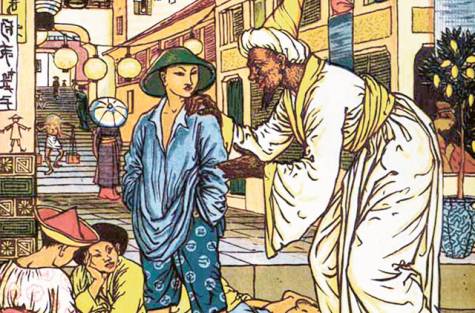
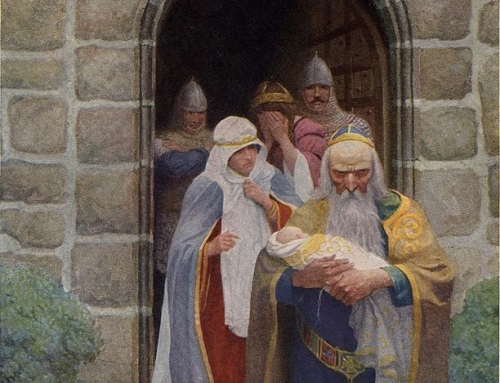
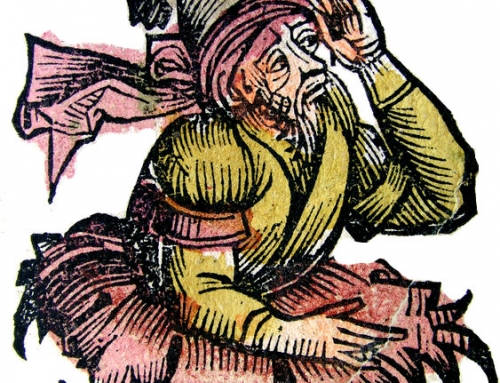

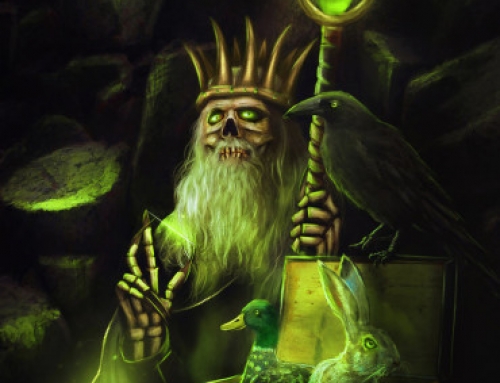
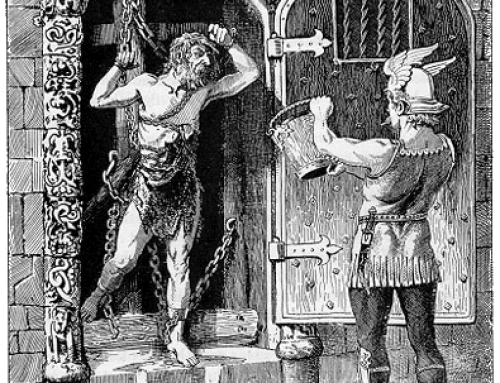
Disney’s Aladdin named the princess Jasmine, which is a flower, not a gemstone. Her tiger is named Raja, the title for a ruler, because of course the cat is king.
Jason, I just discovered you podcast few days ago, my 8-year old son and I listen to it during morning commute. Great podcast! Good stories, good narrative, smart commentaries. We both really like it!